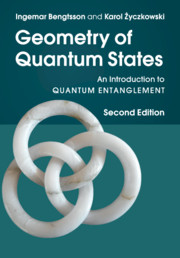Crossref Citations
This Book has been
cited by the following publications. This list is generated based on data provided by Crossref.
Luck, J M
2017.
Equilibration properties of small quantum systems: further examples.
Journal of Physics A: Mathematical and Theoretical,
Vol. 50,
Issue. 35,
p.
355301.
Yamasaki, Hayata
Soeda, Akihito
and
Murao, Mio
2017.
Graph-associated entanglement cost of a multipartite state in exact and finite-block-length approximate constructions.
Physical Review A,
Vol. 96,
Issue. 3,
Mandarino, Antonio
Linowski, Tomasz
and
Życzkowski, Karol
2018.
Bipartite unitary gates and billiard dynamics in the Weyl chamber.
Physical Review A,
Vol. 98,
Issue. 1,
Korzekwa, Kamil
Czachórski, Stanisław
Puchała, Zbigniew
and
Życzkowski, Karol
2018.
Coherifying quantum channels.
New Journal of Physics,
Vol. 20,
Issue. 4,
p.
043028.
Tolar, J
2018.
On Clifford groups in quantum computing.
Journal of Physics: Conference Series,
Vol. 1071,
Issue. ,
p.
012022.
Spitkovsky, Ilya M.
and
Weis, Stephan
2018.
Signatures of quantum phase transitions from the boundary of the numerical range.
Journal of Mathematical Physics,
Vol. 59,
Issue. 12,
p.
121901.
Liang, Weichao
Amini, Nina H.
and
Mason, Paolo
2018.
On Exponential Stabilization of Spin <tex>$-\frac{1}{2}$</tex> Systems.
p.
6602.
Boes, P.
Wilming, H.
Gallego, R.
and
Eisert, J.
2018.
Catalytic Quantum Randomness.
Physical Review X,
Vol. 8,
Issue. 4,
Dogra, Shruti
Dorai, Kavita
and
Arvind
2018.
Majorana representation, qutrit Hilbert space and NMR implementation of qutrit gates.
Journal of Physics B: Atomic, Molecular and Optical Physics,
Vol. 51,
Issue. 4,
p.
045505.
Yamasaki, Hayata
Pirker, Alexander
Murao, Mio
Dür, Wolfgang
and
Kraus, Barbara
2018.
Multipartite entanglement outperforming bipartite entanglement under limited quantum system sizes.
Physical Review A,
Vol. 98,
Issue. 5,
Hebenstreit, M.
Gachechiladze, M.
Gühne, O.
and
Kraus, B.
2018.
Coarse graining of entanglement classes in
2×m×n
systems.
Physical Review A,
Vol. 97,
Issue. 3,
Chanelière, Thierry
Comparat, Daniel
and
Lignier, Hans
2018.
Phase-space-density limitation in laser cooling without spontaneous emission.
Physical Review A,
Vol. 98,
Issue. 6,
Bosyk, G. M.
Bellomo, G.
and
Luis, A.
2018.
Polarization monotones of two-dimensional and three-dimensional random electromagnetic fields.
Physical Review A,
Vol. 97,
Issue. 2,
Rudnicki, Łukasz
Puchała, Zbigniew
and
Zyczkowski, Karol
2018.
Gauge invariant information concerning quantum channels.
Quantum,
Vol. 2,
Issue. ,
p.
60.
Guo, Minyong
Hernandez, Juan
Myers, Robert C.
and
Ruan, Shan-Ming
2018.
Circuit complexity for coherent states.
Journal of High Energy Physics,
Vol. 2018,
Issue. 10,
Xu, Zhen-Yu
You, Wen-Long
Dong, Yu-Li
Zhang, Chengjie
and
Yang, W. L.
2018.
Generalized speed and cost rate in transitionless quantum driving.
Physical Review A,
Vol. 97,
Issue. 3,
Bosyk, G. M.
Bellomo, G.
and
Luis, A.
2018.
Resource-theoretic approach to vectorial coherence.
Optics Letters,
Vol. 43,
Issue. 7,
p.
1463.
Chryssomalakos, C
Guzmán-González, E
and
Serrano-Ensástiga, E
2018.
Geometry of spin coherent states.
Journal of Physics A: Mathematical and Theoretical,
Vol. 51,
Issue. 16,
p.
165202.
Gutiérrez-Cuevas, R
Dennis, M R
and
Alonso, M A
2019.
Generalized Gaussian beams in terms of Jones vectors.
Journal of Optics,
Vol. 21,
Issue. 8,
p.
084001.
Chai, Xudan
Lu, Yi-Ping
Zhang, An-ning
and
Zhao, Qing
2019.
Tomographic reconstruction of multiqubit states by phase lift with the Nesterov algorithm.
Physical Review A,
Vol. 99,
Issue. 4,





